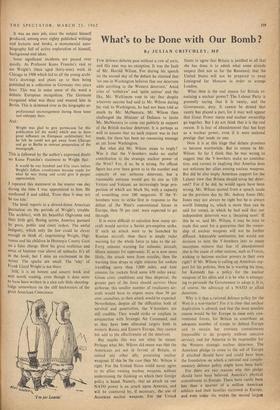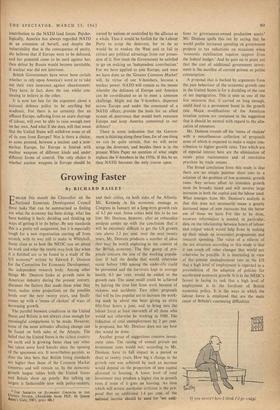What's to be Done with Our Bomb ?
By JULIAN CRITCHLEY, MP Few defence debates pass without a row of sorts, and this year was no exception. It was the fault of Mr. Harold Wilson. For during his speech on the second day of the debate he claimed that `no one in Washington believes that our deterrent adds anything to the Western deterrent.' Amid cries of 'withdraw' and 'quite untrue' and the like, Mr. Watkinson rose to say that despite whatever anyone had said to Mr. Wilson during his visit to Washington, he had not been told as much by Mr. McNamara. Mr. Wilson then challenged the Minister of Defence to invite Mr. McNamara to come out publicly in support of the British nuclear deterrent. It is perhaps as well to assume that no such request was in fact made, for there has been no reassuring message as yet from Washington.
But what did Mr. Wilson mean to imply? Was it that the V-bombers make no useful contribution to the strategic nuclear power of the West? For, if so, he is wrong. No official figure has ever been given as to the number and capacity of our airborne deterrent, but a reasonable estimate would put its size as 120 Victors and Vulcans, an increasingly large pro- portion of which are Mark Ils, with a capacity of something over 100 megatons. If the V- bombers were to strike first in response to the defeat of the West's conventional forces in Europe, then .50 per cent. were expected to get through.
It is more difficult to calculate how many air- craft would survive a Soviet pre-emptive strike. If such an attack were to be launched by Russian aircraft, then there is ample radar warning for the whole force to take to the air. Forty minutes warning for subsonic aircraft, fifteen minutes for supersonic. If, as is now more likely, the attack were from missiles, then the warning time drops to eight minutes for rockets travelling more than 1,000 miles, and four minutes for rockets fired some 650 miles away. Given crisis conditions and thus dispersal, the greater part of the force should survive. Once airborne, this smaller number of retaliatory air- craft would have to expect more than 50 per cent. casualties, as their attack would be expected. Nevertheless, despite all the difficulties both of survival and penetration, the V-bombers are still credible. They would strike or retaliate in conjunction with Strategic Air Command, and as they have been allocated targets both in western Russia and Eastern Europe, they cannot but add to the effectiveness of the deterrent.
But maybe this was not what he meant. Perhaps what Mr. Wilson did mean was that the Americans are not in favour of Britain, or indeed any other ally, possessing nuclear weapons. If this be the case then Mr. Wilson is right. For the United States could never agree to its allies owning nuclear weapons without undermining the thinking on which their foreign policy is based. Namely, that an attack on one NATO power is an attack upon America, and will be countered by, if necessary, the use of American nuclear weapons. For the United States to agree that Britain is justified in all that she has done is to admit what some already suspect (but not so far the Russians), that the United States will not be prepared to swap Leningrad for Moscow in order to avenge London.
What then is the real reason for Britain re- maining a nuclear power? The Labour Party is presently saying that it is vanity, and the Government, duty. It cannot be denied that vanity has played a part, for it may well appear that Great Power status and nuclear ownership go together. But I do not think that it is the real reason. It is fear of abandonment that has kept us a nuclear power, even if it were national prestige that made us one.
Now it is at this stage that debate promises to become worthwhile. But to return to Mr.
Wilson. So far I think that he was wrong to suggest that the V-bombers make no contribu- tion, and correct in implying that America does not welcome her allies owning nuclear weapons. But did he also imply American support for the Labour view that Britain should scrap her deter- rent? For if he did, he would again have been wrong. Mr. Wilson quoted from a speech made on the previous day by Mr. Aubrey Jones (Mr. Jones may not always be right but he is always worth listening to, which is more than can be said for some), in which he had said that our independent deterrent was a 'decaying asset.' If this be so, said Mr. Wilson, it may be time to trade this asset for a guarantee that the owner- ship of nuclear weapons will not be further diffused. Admirable sentiments, but would our decision to turn the V-bombers into so many saucepans remove that fear of abandonment that is the cause of other nations, such as France, wishing to become nuclear powers in their own right? If Mr. Wilson is calling up American sup- port for his policies, then he is wasting his time, for Kennedy has a policy for the nuclear weapons of his allies and it is he who is attempt- ing to persuade the Government to adopt it. It is, of course, the advocacy of a NATO or allied deterrent.
Why is it that a rational defence policy for the West is a non-starter? For it is clear that nuclear duplication is absurd, and that the most sensible course would be for Europe to raise only con- ventional forces, for Britain to contribute an adequate number of troops to defend Europe and to sustain her overseas commitments (impossible to do properly without selective service), and for America to be responsible for the Western strategic nuclear deterrent. The American pledge to come to the aid of Europe if attacked should have and could have been the foundation on which a rational and comple- mentary defence policy might have been built.
For there are two reasons why this pledge should have been believed. America's physical commitment to Europe. There have rarely been less than a quarter of a million American soldiers and their families stationed in Europe, and even today she makes the second largest contribution to the NATO land forces. Psycho- logically, America has always regarded NATO as an extension of herself, and despite the vulnerability that is the consequence of parity, she believes that if Europe were to be defeated, and her potential came to be used against her, then defeat by Russia would become inevitable, if nuclear war did not intervene.
British Governments have never been certain whether to rely upon America's word or to take out their Own insurance against abandonment. They have, in fact, done the one whilst con- tinuing to believe in the other.
It is now too late for the argument about a national defence policy to be anything but academic. For there is no certainty that an affluent Europe, suffering from an acute shortage of labour, will ever be able to raise enough men on her own. And what if she does, will that mean that the United States will withdraw some or all of its men from Europe? Nor is there a choice, as some pretend, between a nuclear and a non- nuclear Europe, for Europe is littered with nuclear weapons of different kinds and wider different forms of control. The only choice is whether nuclear weapons in Europe should be owned by nations or controlled by the alliance as a whole. Thus it would be foolish for the Labour Party to scrap the deterrent, for to do so would be to weaken the West and to fail to extract any political advantage from our posses- sion of it. Nor must the Government be satisfied to go on making an 'independent contribution.' For we have applied to join Europe, and once we have done so the 'Greater Common Market' will, by virtue of our V-bombers, become a nuclear power. NATO will remain as the means whereby the defences of Europe and America can be co-ordinated so as to meet a common challenge. Might not the V-bombers, dispersed across Europe and under the command of a NATO officer, provide the basis for an allied system of .deterrence that would both reasssure Europe and keep America committed to our defence?
There is some indication that the Govern- ment is thinking along these lines, for of one thing we can be quite certain, that we will never scrap the deterrent, and besides there is in the present White Paper no mention of what might replace the V-bombers in the 1970s. If this be so, then NATO becomes the only course open.



































 Previous page
Previous page